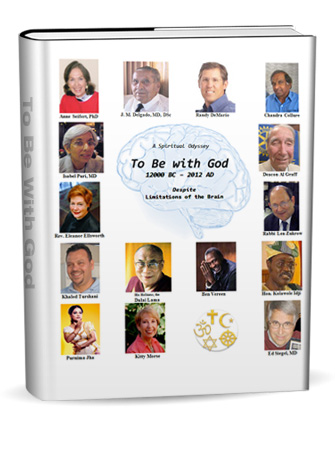Author

Now available. Buy your copy here.
A Spiritual Odyssey To Be with God
(12000 BC - 2012 AD)
Despite Limitations of the Brain
Abstract: Most everyone has had some sort of spiritual journey; some finding a path that becomes true for them; others remaining uncertain or giving up. This book is devoted to exploring the surprising number of similarities among all major faith traditions. It includes the fascinating spiritual journey of its editor, Dr. Ed Siegel, physician, psychiatrist, teacher, pianist, and world traveler who has independently visited over eighty countries.
Dr. Siegel, while coincidently traveling forty days and forty nights, spontaneously composed a dense 81 word sentence which he decided to call his “laconic synthesis.” This sentence, the impetus for this book, seemingly brings together all major religions without changing their names, beliefs or practices.
Each religion has arrived at its own process of trying to do the impossible: to explain how the universe and its wonders were created from nothing; to understand the conceived creator’s plan; to know what is expected of us and how to meet those expectations; and to know with some certainty what happens to the self after death. In attempting to answer these questions, each major religion or faith tradition has evolved to provide not only answers, but other very important functions as well. These include: 1) a sense of belonging and identity; 2) an environment and a faith that facilitates the experience and expression of gratitude, remembrance, contrition and hope; 3) provisions for teaching right from wrong; 4) traditions for celebrating life cycle events; and, 5) through the use of prayer, symbols, rituals, music, and even silence – feelings of inspiration, transcendence, and awe.
We readily accept the fact that even though our dearest canine friends can smell and hear things that we cannot, they have obvious limitations of their brains; and those peace-loving dolphins whose capabilities in several ways exceed our own, also have obvious limitations of their brains. We are reluctant however, in acknowledging that the human brain, even with its approximately one hundred billion neurons, presently has limitations as to what it can perceive and comprehend.
Albert Einstein, arguably history’s most profoundly advanced scientist, once stated that “there is an order in the universe that is beyond comprehension,” leading him to famously state that “God does not play dice.” Accordingly, this book includes a very important and convincing chapter on the limitations of our human brain by the celebrated and pioneering neuroscientist, Jose Manuel Delgado, M.D., PhD.
The book you are about to read also contains chapters by credible, sometimes truly distinguished co-authors, each from one of six major faith traditions; each sharing an essential aspect of his or her religion - an aspect common to all religions. Among them are the internationally known entertainer and inspirational speaker, Ben Vereen; India’s treasured Hindu Kathak dancer, Purnima Jha; and Benin West Africa’s former President of Parliament, the Hon. Kolawole Idji. Other co-authors include a distinguished Episcopal priest; a Libyan Muslim who is both a successful businessman and a student of the Koran; a rabbi who served the oldest Jewish congregation in Florida; Catholic and Presbyterian deacons; a Hindu psychiatrist, and a Buddhist City Engineer. With the inclusion of writings by the renowned Buddhist teacher and spiritual leader, His Holiness, the Dalai Lama, the book ends optimistically urging us to recognize and share with mutual respect, harmony, and ethical behavior, the commonalities that religious traditions can provide humanity.
The Stressor Debate in PTSD: An Intimate Assessment - Published from the World Psychiatric Association Symposium on the "Psychopathology of Traumatic Stress," Helsinki, 1991